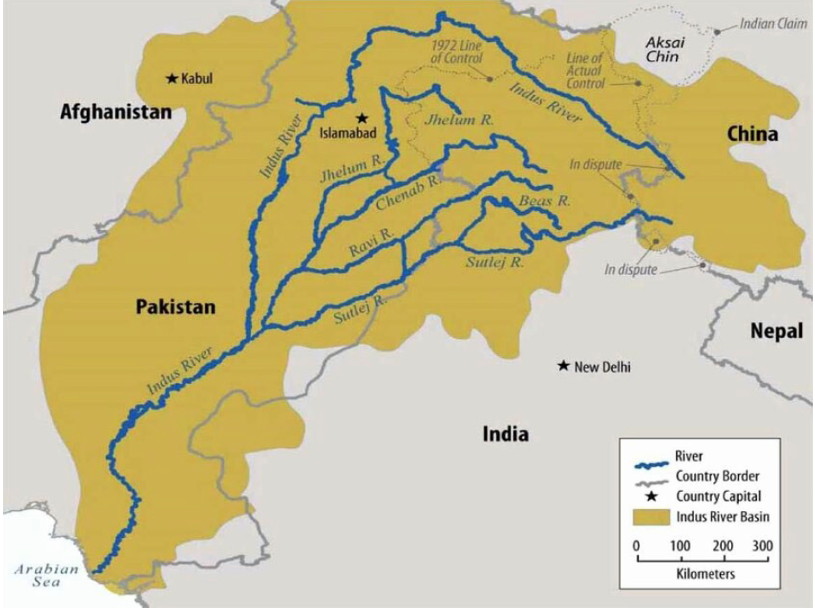Clingendael Alert, July 2025
On 23 April 2025, India temporarily suspended the Indus Water Treaty (IWT) with Pakistan, citing national security concerns following the Pahalgam attack by a supposedly Pakistan-based militant group. This move, rooted in deepening political and hydrological tensions, marks a significant rupture in one of the world’s most resilient water-sharing frameworks. This Alert explores this unprecedented development from a strategic and water cooperation perspective.
The IWT: Resilient yet rigid
Signed in 1960 under World Bank mediation, the IWT allocated the Indus River System’s eastern tributaries (Ravi, Beas, Sutlej) to India and the western ones (Indus, Jhelum, Chenab) to Pakistan. Though not without criticisms, it functioned as a rare cooperative mechanism, surviving wars and diplomatic crises while offering vital irrigation and energy benefits to both sides.

Beyond water allocation, the treaty institutionalised regular dialogue through a Permanent Indus Commission, facilitating data exchange and site inspections even when diplomatic ties were frozen. It served as a model for conflict-resistant water diplomacy.
However, over the decades, the world around the treaty has changed. India and Pakistan’s combined population now exceeds 1.6 billion, with escalating urban water stress, groundwater depletion, glacial melt, and climate variability across the Indus Basin. These factors, coupled with growing energy demands and ecological degradation, have exposed the treaty’s rigidity and lack of adaptability.
Drivers behind the temporary suspension:
India’s move to suspend the IWT stems from multiple interlinked motivations:
- Hydrological and political frustration: India has long voiced dissatisfaction with the treaty’s inability to address 21st-century realities. Following the 2016 Uri attack, India began framing Indus waters as a national security issue. In 2023, it formally sought treaty modification, objecting to Pakistan’s resistance to dispute mechanism reforms and hydroelectric projects.
- Military escalation: The Pahalgam attack created a political moment to enact this longstanding discontent. While the treaty had withstood previous wars, the current suspension serves as a coercive diplomatic tool, reflecting both security and strategic concerns.
- Global trends: A distracted international community, coupled with a growing trend of sidelining multilateral norms, enabled India’s move to occur with limited external scrutiny. Against the backdrop of crises elsewhere, the abeyance appears less extraordinary than it might have in earlier years.
- Tactical and strategic messaging: While not a full withdrawal, the temporary suspension signals what such a future might entail and delivers a sobering preview of intensified upstream-downstream tensions without a functional agreement.
Impact on Pakistan:
As a downstream country heavily reliant on the Indus Basin, Pakistan faces grave consequences. Declining groundwater and erratic surface flows have already been pushing the country into a state of “absolute water scarcity.” A prolonged suspension could imperil:
- Urban water supplies in cities like Lahore and Karachi.
- Energy security, with about 27% of electricity from hydropower sourced from IWT rivers.
- Food production, as 80% relies on Indus irrigation.
- Disaster preparedness, due to the halt in Indian data sharing which is critical for flood forecasting.
Implications for India:
Though intended to exert pressure on Pakistan, the suspension also carries costs for India. Fully utilising its share of the western rivers demands extensive investments in water infrastructure across geologically fragile Himalayan terrain. Rapid project approvals without environmental checks risk backlash, including from local Kashmiri communities wary of displacement and militarisation.
Moreover, the move may compromise India’s image as a responsible international actor, especially as it pursues leadership roles in global forums. It also weakens a rare and reliable dialogue channel with Pakistan, while complicating dynamics with China, a key player in regional water politics.
Pathways Forward: Rethinking co-operation
Despite the current impasse, the IWT has not been officially terminated. India’s conditional suspension reflects a push to recalibrate terms and power asymmetries. Notably, Pakistan has signalled willingness to revisit treaty terms.
Moving forward, cooperation remains imperative. Options include renegotiating the IWT, establishing a more flexible and climate-resilient framework, or shifting toward informal, needs-based collaboration. Technocratic and scientific dialogue, supported by third parties, could rebuild trust and form the basis for a new water diplomacy model.
Ultimately, water remains a shared and vital resource. The treaty’s suspension, while serious, may yet serve as a catalyst for a more adaptive, inclusive, and future-proof mode of cooperation.
This alert is published by the Clingendael Institute and is written by Tobias von Lossow and Akanksha Singh. To read the complete paper, follow the link here.



